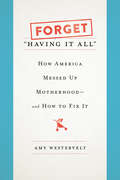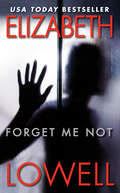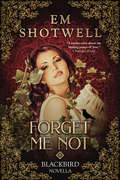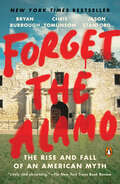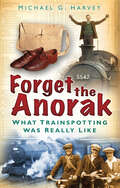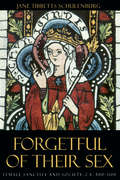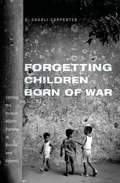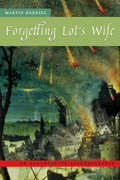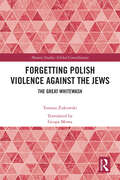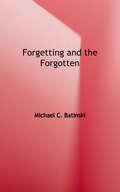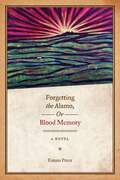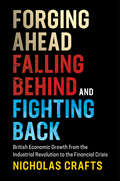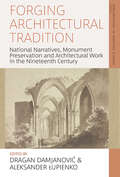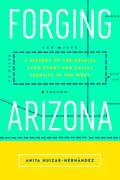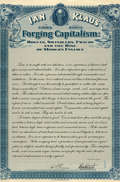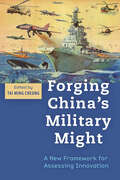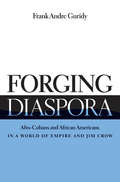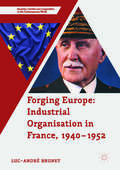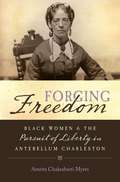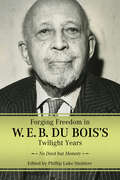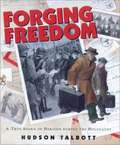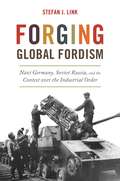- Table View
- List View
Forget "Having It All": How America Messed Up Motherhood--and How to Fix It
by Amy WesterveltA clear-eyed look at the history of American ideas about motherhood, how those ideas have impacted all women (whether they have kids or not), and how to fix the inequality that exists as a result. After filing a story only two hours after giving birth, and then getting straight back to full-time work the next morning, journalist Amy Westervelt had a revelation: America might claim to revere motherhood, but it treats women who have children like crap. From inadequate maternity leave to gender-based double standards, emotional labor to the "motherhood penalty" wage gap, racist devaluing of some mothers and overvaluing of others, and our tendency to consider women's value only in terms of their reproductive capacity, Westervelt became determined to understand how we got here and how the promise of "having it all" ever even became a thing when it was so far from reality for American women. In Forget "Having It All," Westervelt traces the roots of our modern expectations of mothers and motherhood back to extremist ideas held by the first Puritans who attempted to colonize America and examines how those ideals shifted--or didn't--through every generation since. Using this historical backdrop, Westervelt draws out what we should replicate from our past (bringing back home economics, for example, this time with an emphasis on gender-balanced labor in the home), and what we must begin anew as we overhaul American motherhood (including taking a more intersectional view of motherhood, thinking deeply about the ways in which capitalism influences our views on reproduction, and incorporating working fathers into discussions about work-life balance). In looking for inspiration elsewhere in the world, Westervelt turned not to Scandinavia, where every work-life balance story inevitably ends up, but to Japan where politicians, in an increasingly desperate effort to increase the country's birth rates (sound familiar?), tried to apply Scandinavian-style policies atop a capitalist democracy not unlike America's, only to find that policy can't do much in the absence of cultural shift. Ultimately, Westervelt presents a measured, historically rooted and research-backed call for workplace policies, cultural norms, and personal attitudes about motherhood that will radically improve the lives of not just working moms but all Americans.
Forget Me Not
by Elizabeth LowellThe terrible tragedy Alana Reeves suffered on Wyoming's Broken Mountain has vanished from her memory. Now nothing remains of those six lost days that cost her everything she held dear. But a man has appeared from the shadows of Alana's past -- a rugged outdoorsman who once dwelt in a wounded heart he is now sworn to heal. Like an answered prayer, Rate Winter has come to lead Alana out of the darkness -- and back to the scene of the nightmare she has erased from her mind. Alana must follow him -- for in Rate's powerful arms her fears can be conquered, and through his love hers can be reborn.
Forget Me Not
by Stef Ann HolmA cattle drive is no place for a lady in bows and buttons...unless she's in love with a rancher in denim and rawhide. Love sizzles in this Western romance from USA TODAY bestselling author Stef Ann Holm.Newly independent city girl Josephine Whittaker succeeded in heading West, all on her own. But once she set foot in the crude cow town of Sienna, Wyoming, her first inclination was to board the next train back out--and she would have, if she hadn't lost everything she owned. Suddenly, a job as a ranch cook seemed a good idea--at least it was better than making money as a dance-hall girl. It didn't seem that important if she neglected to tell her new boss that she'd never so much as boiled an egg... J.D. McCall knew from the get-go that a pretty lady in the chuck wagon with a bunch of cowboys meant trouble. But he faced mutiny among his ranch hands if he didn't bring home a cook--and she said fried beef was her specialty. How could he know he'd never want to let her go? J.D.'s own mother had abandoned his father and the harsh frontier life to go back East. Loving Josephine was sure to break his heart...unless this lady proved she had grit, gumption, and what it took to be a cattle rancher's wife--his wife.
Forget Me Not (Blackbird)
by Em ShotwellWar threatens newfound happiness for a matched-up magical couple in this Southern Gothic, new adult fantasy novella prequel to Blackbird Summer.When Rex Somersby&’s family matchmaker sets him up with the famous Evelyn Cadeau, he can&’t believe his luck. Evelyn is the woman with the perfect Gift—the woman every man wants—while Rex&’s own magical ability leaves much to be desired. He travels from Missouri to meet his dream girl in her rural Mississippi home, where Evelyn makes it clear that winning her heart won&’t be an easy task. Good thing farm-boy Rex has never been afraid of a little hard work.Evelyn Cadeau is used to getting her way. As the woman with the most powerful Gift, she knows she can have her pick of anyone she wants. And who she wants is slick, handsome, and off-limits Guy McCallister—not gawky, buttoned-up Rex Somersby. Yet, after an arranged date with Rex takes a dramatic turn, leading to a bottle of wine and sneaking to the creek for a late night skinny dip, she realizes there may be more to by-the-rules Rex than meets the eye. Just as the young couple start to think their family&’s tradition of matchmaking isn&’t quite so backward, Rex is drafted to Vietnam. With war threatening to tear them apart, will love be able to save them? Or will it take a bit of magic?&“Slow-burning and leisurely, this romance captures the charm of small towns and the tension of the late 1960s, allowing its leads to come together at their own pace…. A tender story about the healing power of love.&”—Publishers Weekly
Forget the Alamo: The Rise and Fall of an American Myth
by Bryan Burrough Chris Tomlinson Jason StanfordThree noted Texan writers combine forces to tell the real story of the Alamo, dispelling the myths, exploring why they had their day for so long, and explaining why the ugly fight about its meaning is now coming to a head. <P><P> Every nation needs its creation myth, and since Texas was a nation before it was a state, it's no surprise that its myths bite deep. There's no piece of history more important to Texans than the Battle of the Alamo, when Davy Crockett and a band of rebels went down in a blaze of glory fighting for independence from Mexico, losing the battle but setting Texas up to win the war. However, that version of events, as Forget the Alamo definitively shows, owes more to fantasy than reality. Just as the site of the Alamo was left in ruins for decades, its story was forgotten and twisted over time, with the contributions of Tejanos--Texans of Mexican origin, who fought alongside the Anglo rebels--scrubbed from the record, and the origin of the conflict over Mexico's push to abolish slavery papered over. Forget the Alamo provocatively explains the true story of the battle against the backdrop of Texas's struggle for independence, then shows how the sausage of myth got made in the Jim Crow South of the late nineteenth and early twentieth century. As uncomfortable as it may be to hear, celebrating the Alamo has long had an echo of celebrating whiteness. <P><P> In the past forty-some years, waves of revisionists have come at this topic, and at times have made real progress toward a more nuanced and inclusive story that doesn't alienate anyone. But we are not living in one of those times; the fight over the Alamo's meaning has become more pitched than ever in the past few years, even violent, as Texas's future begins to look more and more different from its past. It's the perfect time for a wise and generous-spirited book that shines the bright light of the truth into a place that's gotten awfully dark. <P><P><b>A New York Times Best Seller</b>
Forget the Anorak: What Trainspotting Was Really Like
by Michael G HarveyMichael Harvey's new book brings to its reader the excitement of trainspotting in the 1950s and 60s, the hobby's heyday. It was the advent of the famous Ian Allan ABC Locospotters books that really gave the hobby the impetus, as they gave transpotters all the information they required. Forget the Anorak sets out to provide the reader with a personal account of what the hobby entailed - teenagers roaming the railways of Britain, sleeping on deserted platforms on porters' trolleys, 'bunking' dimly lit depots and eluding capture, travelling hundreds of miles ona platform ticket, and stink bombs on the Underground. You'll be able to smell the steam, soot and unwashed socks, and taste the boiled egg sandwiches, the chips wrapped in newspaper and the hot jam doughnuts, all washed down with warm Tizer. Illustrated with Michael Harvey's own photographs and a selection of maps, Forget the Anorak will appeal to anyone who experienced the golden days of trainspotting, as well as to anyone interested in the social history of Britain after the Second World War.
Forgetful of Their Sex: Female Sanctity and Society, ca. 500–1100
by Jane Tibbetts SchulenburgIn this remarkable study of over 2,200 female and male saints, Jane Schulenburg explores women's status and experience in early medieval society and in the Church by examining factors such as family wealth and power, patronage, monasticism, virginity, and motherhood. The result is a unique depiction of the lives of these strong, creative, independent-minded women who achieved a visibility in their society that led to recognition of sanctity. "A tremendous piece of scholarship. . . . This journey through more than 2,000 saints is anything but dull. Along the way, Schulenburg informs our ideas regarding the role of saints in the medieval psyche, gender-specific identification, and the heroics of virginity." —Library Journal "[This book] will be a kind of 'roots' experience for some readers. They will hear the voices, haunted and haunting, of their distant ancestors and understand more about themselves." —Christian Science Monitor "This fascinating book reaches far beyond the history of Christianity to recreate the 'herstory' of a whole gender." —Kate Saunders, The Independent
Forgetting Children Born of War: Setting the Human Rights Agenda in Bosnia and Beyond
by R. Charli CarpenterSexual violence and exploitation occur in many conflict zones, and the children born of such acts face discrimination, stigma, and infanticide. Yet the massive transnational network of organizations working to protect war-affected children has, for two decades, remained curiously silent on the needs of this vulnerable population. Focusing specifically on the case of Bosnia-Herzegovina, R. Charli Carpenter questions the framing of atrocity by human rights organizations and the limitations these narratives impose on their response. She finds that human rights groups set their agendas according to certain grievances-the claims of female rape victims or the complaints of aggrieved minorities, for example-and that these concerns can overshadow the needs of others. Incorporating her research into a host of other conflict zones, Carpenter shows that the social construction of rights claims is contingent upon the social construction of wrongs. According to Carpenter, this pathology prevents the full protection of children born of war.
Forgetting Lot's Wife: On Destructive Spectatorship
by Martin HarriesCan looking at disaster and mass death destroy us? Forgetting Lot’s Wife provides a theory and a fragmentary history of destructive spectatorship in the twentieth century. Its subject is the notion that the sight of historical catastrophe can destroy the spectator. The fragments of this history all lead back to the story of Lot’s wife: looking back at the destruction of the cities of Sodom and Gomorrah, she turns into a pillar of salt. This biblical story of punishment and transformation, a nexus of sexuality, sight, and cities, becomes the template for the modern fear that looking back at disaster might petrify the spectator. Although rarely articulated directly,this idea remains powerful in our culture. This book traces some of its aesthetic, theoretical, and ethical consequences. Harries traces the figure of Lot’s wife across media. In extended engagements with examples from twentieth-century theater, film, and painting, he focuses on the theatrical theory of Antonin Artaud, a series of American films, and paintings by Anselm Kiefer. These examples all return to the story of Lot’s wife as a way to think about modern predicaments of the spectator. On the one hand, the sometimes veiled figure of Lot’s wife allows these artists to picture the desire to destroy the spectator; on the other, she stands as a sign of the potential danger to the spectator. These works, that is, enact critiques of the very desire that inspires them.The book closes with an extended meditation on September 11, criticizing the notion that we should have been destroyed by witnessing the events of that day.
Forgetting Polish Violence Against the Jews: The Great Whitewash (Memory Studies: Global Constellations)
by Tomasz ŻukowskiDuring the Holocaust, Polish bystanders were witnesses not only to Nazi crimes but also to their own collective violence toward Jewish neighbors. This book shows how these memories continue to be distorted and silenced in the Polish culture.Considering the ways in which Polish culture displays symptoms of a suppressed and violent memory while obstinately refusing to see the meaning of such symptoms, the author shows how the narrative of the Holocaust, in threatening the self-image of the community, causes a continuous anxiety and thus compulsive and neurotic reactions. Through analyses of a wide range of literary, journalistic, commemorative, and cinematic texts, Forgetting Polish Violence Against the Jews sheds light on a set of narrative and discursive models connected with social practices, which serve to discipline individuals – especially Polish Jews – while generating pressure to defend both habits of silence and also an idealized selfimage of the Polish Christian majority.This book will appeal to scholars with interests in memory studies, cultural studies, Holocaust studies, and psychoanalytic studies.
Forgetting and the Forgotten: A Thousand Years of Contested Histories in the Heartland (Shawnee Bks.)
by Michael C. BatinskiHistories try to forget, as this evocative study of one community reveals. This book details the nature of how a community forged its story against outsiders. <p><p>Historian Michael C. Batinski explores the habits of forgetting that enable communities to create an identity based on silencing competing narratives. The white settlers of Jackson County, Illinois, shouldered the hopes of a community and believed in the justice of their labor as it echoed the national story. The county's past keepers, or keepers of the past, emphasizing the white settlers' republican virtue, chose not to record violence against Kaskaskia people and African Americans and to disregard the numerous transient laborers. Instead of erasing the presence of outsiders, the past keepers could offer only silence, but it was a silence that could be broken. <p><p>Batinski's historiography critically examines local historical thought in a way that illuminates national history. What transpired in Jackson County was repeated in countless places throughout the nation. At the same time, national history writing rarely turns to experiences that can be found in local archives such as court records, genealogical files, archaeological reports, coroner's records, and veterans' pension files. <p><p>In this archive, juxtaposed with the familiar actors of Jackson County history—Benningsen Boon, John A. Logan, and Daniel Brush—appear the Sky People, Italian immigrant workers, black veterans of the Civil War and later champions of civil rights whose stories challenge the dominant narrative.
Forgetting the Alamo, Or, Blood Memory: A Novel (Chicana Matters)
by Emma PérezIn this literary novel set in nineteenth-century Texas, a Tejana lesbian cowgirl embarks on an adventure after the fall of the Alamo.Micaela Campos witnesses the violence against Mexicans, African Americans, and indigenous peoples after the infamous battles of the Alamo and of San Jacinto, both in 1836. Resisting an easy opposition between good versus evil and brown versus white characters, the novel also features Micaela&’s Mexican-Anglo cousin who assists and hinders her progress. Micaela&’s travels give us a new portrayal of the American West, populated by people of mixed races who are vexed by the collision of cultures and politics. Ultimately, Micaela&’s journey and her romance with a Black/American Indian woman teach her that there are no easy solutions to the injustices that birthed the Texas Republic . . .This novel is an intervention in queer history and fiction with its love story between two women of color in mid-nineteenth-century Texas. Pérez also shows how a colonial past still haunts our nation&’s imagination. The battles of the Alamo and San Jacinto offered freedom and liberty to Texans, but what is often erased from the story is that common people who were Mexican, Indian, and Black did not necessarily benefit from the influx of so many Anglo immigrants to Texas. The social themes and identity issues that Pérez explores—political climate, debates over immigration, and historical revision of the American West—are current today.&“Pérez&’s sparse, clean writing style is a blend of Cormac McCarthy, Carson McCullers, and Annie Proulx. This makes for a quick and engrossing reading experience as the narrative has a fluid quality about it.&” —Alicia Gaspar de Alba, professor and chair of Chicana and Chicano Studies, University of California, Los Angeles, and author of Sor Juana&’s Second Dream &“Riveting . . . Emma Pérez captures well the violence and the chaos of the southwest borderlands during the time of territorial and international disputes in the 1800s. . . . Perez vividly depicts the conflicts between nations with the authority of a historian and with language belonging to a poet. A fine, fine read.&” —Helena Maria Viramontes, author of Their Dogs Came with Them&“Pérez&’s new novel . . . Powerfully presents a revenge tale from an unusual point of view, that of a displaced Chicana in 1836 Texas. . . . The writing is sharp and clever. The dialogue is realistic.&” —Lambda Literary, Lambda Award Finalist &“Filled with lush beauty, harshness, and horrifying brutality, this is one of those books in which you just KNOW what&’s going to happen at the end—but you&’re wrong.&” —The Gay & Lesbian Review
Forgetting the Alamo, or, Blood Memory: A Novel (Chicana Matters)
by Emma PérezThis literary adventure takes place in nineteenth-century Texas and follows the story of a Tejana lesbian cowgirl after the fall of the Alamo. Micaela Campos, the central character, witnesses the violence against Mexicans, African Americans, and indigenous peoples after the infamous battles of the Alamo and of San Jacinto, both in 1836. Resisting an easy opposition between good versus evil and brown versus white characters, the novel also features Micaela's Mexican-Anglo cousin who assists and hinders her progress. Micaela's travels give us a new portrayal of the American West, populated by people of mixed races who are vexed by the collision of cultures and politics. Ultimately, Micaela's journey and her romance with a black/American Indian woman teach her that there are no easy solutions to the injustices that birthed the Texas Republic.<P><P> This novel is an intervention in queer history and fiction with its love story between two women of color in mid-nineteenth-century Texas. Pérez also shows how a colonial past still haunts our nation's imagination. The battles of the Alamo and San Jacinto offered freedom and liberty to Texans, but what is often erased from the story is that common people who were Mexican, Indian, and Black did not necessarily benefit from the influx of so many Anglo immigrants to Texas. The social themes and identity issues that Pérez explores—political climate, debates over immigration, and historical revision of the American West—are current today.
Forging Ahead, Falling Behind and Fighting Back: British Economic Growth from the Industrial Revolution to the Financial Crisis
by Nicholas CraftsTo what extent has the British economy declined compared to its competitors and what are the underlying reasons for this decline? Nicholas Crafts, one of the world's foremost economic historians, tackles these questions in a major new account of Britain's long-run economic performance. He argues that history matters in interpreting current economic performance, because the present is always conditioned by what went before. Bringing together ideas from economic growth theory and varieties of capitalism to endogenous growth and cliometrics, he reveals the microeconomic foundations of Britain's economic performance in terms of the impact of institutional arrangements and policy choices on productivity performance. The book traces Britain's path from the first Industrial Revolution and global economic primacy through to its subsequent long-term decline, the strengths and weaknesses of the Thatcherite response, and the improvement in relative economic performance that was sustained to the eve of the financial crisis.
Forging Architectural Tradition: National Narratives, Monument Preservation and Architectural Work in the Nineteenth Century (Explorations in Heritage Studies #4)
by Dragan Damjanović Aleksander ŁupienkoDuring the nineteenth century, a change developed in the way architectural objects from the distant past were viewed by contemporaries. Such edifices, be they churches, castles, chapels or various other buildings, were not only admired for their aesthetic values, but also for the role they played in ancient times, and their role as reminders of important events from the national past. Architectural heritage often was (and still is) an important element of nation building. Authors address the process of building national myths around certain architectural objects. National narratives are questioned, as is the position architectural heritage played in the nineteenth and the early twentieth centuries.
Forging Arizona: A History of the Peralta Land Grant and Racial Identity in the West (Latinidad: Transnational Cultures in the)
by Anita Huizar-HernándezIn Forging Arizona Anita Huizar-Hernández looks back at a bizarre nineteenth-century land grant scheme that tests the limits of how ideas about race, citizenship, and national expansion are forged. During the aftermath of the U.S.-Mexico War and the creation of the current border, a con artist named James Addison Reavis falsified archives around the world to pass his wife off as the heiress to an enormous Spanish land grant so that they could claim ownership of a substantial portion of the newly-acquired Southwestern territories. Drawing from a wide variety of sources including court records, newspapers, fiction, and film, Huizar-Hernández argues that the creation, collapse, and eventual forgetting of Reavis’s scam reveal the mechanisms by which narratives, real and imaginary, forge borders. An important addition to extant scholarship on the U.S Southwest border, Forging Arizona recovers a forgotten case that reminds readers that the borders that divide nations, identities, and even true from false are only as stable as the narratives that define them.
Forging Capitalism
by Ian KlausVice is endemic to Western capitalism, according to this fascinating, wildly entertaining, often startling history of modern finance. Ian Klaus's Forging Capitalism demonstrates how international financial affairs in the nineteenth century were conducted not only by gentlemen as a noble pursuit but also by connivers, thieves, swindlers, and frauds who believed that no risk was too great and no scheme too outrageous if the monetary reward was substantial enough. Taken together, the grand deceptions of the ambitious schemers and the determined efforts to guard against them have been instrumental in creating the financial establishments of today. In a story teeming with playboys and scoundrels and rich in colorful and amazing events, Klaus chronicles the evolution of trust through three distinct epochs: the age of values, the age of networks and reputations, and, ultimately, in a world of increased technology and wealth, the age of skepticism and verification. In today's world, where the questionable dealings of large international financial institutions are continually in the spotlight, this extraordinary history has great relevance, offering essential lessons in both the importance and the limitations of trust.
Forging China's Military Might: A New Framework for Assessing Innovation
by Tai Ming Cheung“His collection of nine essays offers a comprehensive and insightful assessment of the Chinese defense science and technology (S&T).” —Pacific AffairsAmong the most important issues in international security today are the nature and the global implications of China’s emergence as a world-class defense technology power. Since the beginning of the twenty-first century, the Chinese defense industry has reinvented itself by emphasizing technological innovation and technology. This reinvention and its potential effects, both positive and negative, are attracting global scrutiny. Drawing insights from a range of disciplines, including history, social science, business, and strategic studies, Tai Ming Cheung and the contributors to Forging China’s Military Might develop an analytical framework to evaluate the nature, dimensions, and spectrum of Chinese innovation in the military and broader defense spheres.Forging China’s Military Might provides an overview of the current state of the Chinese defense industry and then focuses on subjects critical to understanding short- and long-term developments, including the relationship among defense contractors, regulators, and end-users; civil-military integration; China’s defense innovation system; and China’s place in the global defense economy. Case studies look in detail at the Chinese space and missile industry.“Constitutes high-quality, cutting-edge research on China’s defense industries. It should enjoy broad appeal—among academics, policy makers, security analysts, and business people in countries around the world.” —Andrew Scobell, RAND Corporation“Forging China’s Military Might belongs in any political science shelf interested in China’s issues and international security and considers the nature of China’s emergence as a world power.” —Midwest Book Review
Forging Diaspora: Afro-cubans and African Americans in a World of Empire and Jim Crow
by Frank Andre GuridyCuba's geographic proximity to the United States and its centrality to U. S. imperial designs following the War of 1898 led to the creation of a unique relationship between Afro-descended populations in the two countries. In Forging Diaspora, Frank Andre Guridy shows that the cross-national relationships nurtured by Afro-Cubans and black Americans helped to shape the political strategies of both groups as they attempted to overcome a shared history of oppression and enslavement. Drawing on archival sources in both countries, Guridy traces four encounters between Afro-Cubans and African Americans. These hidden histories of cultural interaction--of Cuban students attending Booker T. Washington's Tuskegee Institute, the rise of Garveyism, the Havana-Harlem cultural connection during the Harlem Renaissance and Afro-Cubanism movement, and the creation of black travel networks during the Good Neighbor and early Cold War eras--illustrate the significance of cross-national linkages to the ways both Afro-descended populations negotiated the entangled processes of U. S. imperialism and racial discrimination. As a result of these relationships, argues Guridy, Afro-descended peoples in Cuba and the United States came to identify themselves as part of a transcultural African diaspora.
Forging Europe: Industrial Organisation in France, 1940–1952
by Luc-André BrunetThis book is a detailed and original look at the radical reorganisation of French heavy industry in the turbulent period between the establishment of the Vichy regime in 1940 and the creation of the European Coal and Steel Community (ECSC), the forerunner to the European Union, in 1952. By studying institutions ranging from Vichy’s Organisation Committees to Jean Monnet’s Commissariat Général du Plan (CGP), Luc-André Brunet challenges existing narratives and reveals significant continuities from Vichy to post-war initiatives such as the Monnet Plan and the ECSC. Based on extensive multi-archival research, this book sheds important new light on economic collaboration and resistance in Vichy, the post-war revival of the French economy, and the origins of European integration.
Forging Freedom
by Amrita Chakrabarti MyersFor black women in antebellum Charleston, freedom was not a static legal category but a fragile and contingent experience. In this deeply researched social history, Amrita Chakrabarti Myers analyzes the ways in which black women in Charleston acquired, defined, and defended their own vision of freedom. Drawing on legislative and judicial materials, probate data, tax lists, church records, family papers, and more, Myers creates detailed portraits of individual women while exploring how black female Charlestonians sought to create a fuller freedom by improving their financial, social, and legal standing. Examining both those who were officially manumitted and those who lived as free persons but lacked official documentation, Myers reveals that free black women filed lawsuits and petitions, acquired property (including slaves), entered into contracts, paid taxes, earned wages, attended schools, and formed familial alliances with wealthy and powerful men, black and white--all in an effort to solidify and expand their freedom. Never fully free, black women had to depend on their skills of negotiation in a society dedicated to upholding both slavery and patriarchy. Forging Freedom examines the many ways in which Charleston's black women crafted a freedom of their own design instead of accepting the limited existence imagined for them by white Southerners.
Forging Freedom in W. E. B. Du Bois's Twilight Years: No Deed but Memory (Margaret Walker Alexander Series in African American Studies)
by Phillip Luke SinitiereContributions by Murali Balaji, Charisse Burden-Stelly, Christopher Cameron, Carlton Dwayne Floyd, Robert Greene II, Andre E. Johnson, Werner Lange, Lisa J. McLeod, Jodi Melamed, Tyler Monson, Eric Porter, Reiland Rabaka, Thomas Ehrlich Reifer, Camesha Scruggs, and Phillip Luke Sinitiere Although the career of W. E. B. Du Bois was remarkable in its entirety, a large majority of scholarship focuses on the first five or six decades. Overlooked and understudied, the closing three decades of Du Bois’s career reflect a generative period of his life in terms of teaching, travel, activism, and publications. Forging Freedom in W. E. B. Du Bois's Twilight Years: No Deed but Memory proposes to narrate the political, social, and cultural significance of Du Bois’s career during the controversial closing three decades of his life. Du Bois’s twilight years were tremendously controversial: his persistent criticism of the collusion between capitalism and racism and his choice to join the Communist Party in late 1961 raised the ire of many. At the time, Du Bois’s strident advocacy of socialism and turn to communism during the Cold War oriented most scholars away from delving into his late career. While only a few scholars have engaged the productivity of Du Bois’s later years, the fact is that an anticommunist, antiradical animus has followed Du Bois in the half century since his death. As a result, Du Bois scholarship remains impoverished to the extent that academics neglect his later years. The essays in Forging Freedom in W. E. B. Du Bois's Twilight Years detail selected aspects of Du Bois’s later decades and their particular connection to American social, political, and cultural history between the 1930s and the 1960s. While international concerns and a global perspective also fundamentally defined Du Bois’s latter years, chronicling his final decades in a US context presents fresh insight into his twilight years. Du Bois’s commitment to freedom’s flourishing during this period animated the Black freedom struggle’s war against white supremacy. Ultimately, this book demonstrates that the durability of Du Bois’s intellectual achievements remains relevant to the twenty-first century.
Forging Freedom: A True Story of Heroism During the Holocaust
by Hudson TalbottJaap Penraat has always felt a little Jewish growing up in Amsterdam in the 1930s. His hometown is one of the great Jewish centers of Europe -- until the German forces arrive at the outbreak of World War II and begin targeting the Jewish community. Jaap's instincts are to protect his Jewish friends and neighbors from Nazi persecution, and he sets to work making fake ID cards for them. As the war progresses and the Nazis turn his beloved Amsterdam into a death trap for Jews, Jaap realizes he must take a more drastic action. The scheme he devises requires two things for it to succeed: outsmarting the Nazis at their own game and having nerves of steel. The hardest part for him is not just risking his own life, but deciding which other lives he dares to risk, if he is to save them. Hudson Talbott gives us a dramatic account of a man who knew he must act against these dark forces. As Jaap has said, "You do these things because in your mind there is no other way of doing it".
Forging Freedom: The Formation of Philadelphia's Black Community, 1720-1840
by Gary B. NashThis book is the first to trace the good and bad fortunes, over more than a century, of the earliest large free black community in the United States. Gary Nash shows how, from colonial times through the Revolution and into the turbulent 1830s, blacks in the City of Brotherly Love struggled to shape a family life, gain occupational competence, organize churches, establish neighborhoods and social networks, advance cultural institutions, educate their children in schools, forge a political consciousness, and train black leaders who would help abolish slavery. These early generations of urban blacks--many of them newly emancipated--constructed a rich and varied community life. Nash's account includes elements of both poignant triumph and profound tragedy. Keeping in focus both the internal life of the black community and race relations in Philadelphia generally, he portrays first the remarkable vibrancy of black institution-building, ordinary life, and relatively amicable race relations, and then rising racial antagonism. The promise of a racially harmonious society that took form in the postrevolutionary era, involving the integration into the white republic of African people brutalized under slavery, was ultimately unfulfilled. Such hopes collapsed amid racial conflict and intensifying racial discrimination by the 1820s. This failure of the great and much-watched "Philadelphia experiment" prefigured the course of race relations in America in our own century, an enduringly tragic part of this country's past.
Forging Global Fordism: Nazi Germany, Soviet Russia, and the Contest over the Industrial Order (America in the World #40)
by Stefan J. LinkA new global history of Fordism from the Great Depression to the postwar eraAs the United States rose to ascendancy in the first decades of the twentieth century, observers abroad associated American economic power most directly with its burgeoning automobile industry. In the 1930s, in a bid to emulate and challenge America, engineers from across the world flocked to Detroit. Chief among them were Nazi and Soviet specialists who sought to study, copy, and sometimes steal the techniques of American automotive mass production, or Fordism. Forging Global Fordism traces how Germany and the Soviet Union embraced Fordism amid widespread economic crisis and ideological turmoil. This incisive book recovers the crucial role of activist states in global industrial transformations and reconceives the global thirties as an era of intense competitive development, providing a new genealogy of the postwar industrial order.Stefan Link uncovers the forgotten origins of Fordism in Midwestern populism, and shows how Henry Ford's antiliberal vision of society appealed to both the Soviet and Nazi regimes. He explores how they positioned themselves as America's antagonists in reaction to growing American hegemony and seismic shifts in the global economy during the interwar years, and shows how Detroit visitors like William Werner, Ferdinand Porsche, and Stepan Dybets helped spread versions of Fordism abroad and mobilize them in total war.Forging Global Fordism challenges the notion that global mass production was a product of post–World War II liberal internationalism, demonstrating how it first began in the global thirties, and how the spread of Fordism had a distinctly illiberal trajectory.
